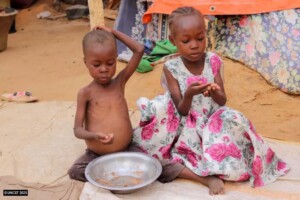Sudan OCHA bulletin 11: Food security improved compared to last year
The food security situation in Sudan has slightly improved compared to the same period last year. In parts of South Kordofan and Jebel Marra however, the situation continues to deteriorate. Nearly 20,000 South Sudanese refugees reportedly arrived in Sudan between 29 April and 6 May. The population of Sortony camp for the displaced in North Darfur are plagued by thirst. In Abu Kershola, South Kordofan, the International Organization for Migration (IOM) is tackling water and sanitation needs of Nuba displaced.
The food security situation in Sudan has slightly improved compared to the same period last year. In parts of South Kordofan and Jebel Marra however, the situation continues to deteriorate. Nearly 20,000 South Sudanese refugees reportedly arrived in Sudan between 29 April and 6 May. The population of Sortony camp for the displaced in North Darfur are plagued by thirst. In Abu Kershola, South Kordofan, the International Organization for Migration (IOM) is tackling water and sanitation needs of the displaced people in the area.
The UN Office for the Coordination of Humanitarian Affairs (OCHA) in Sudan reported in its latest humanitarian bulletin that the food security situation in the country has slightly improved compared to the same period last year, according to the latest report by the Integrated Food Security Phase Classification (IPC).
As a result of generally favourable rainfall during the 2016 summer cropping season in most parts of Sudan, almost eight million metric tonnes (MT) of cereals were produced in the November 2016-February 2017 agricultural season.
Sorghum, millet and wheat are main staple foods in Sudan. In aggregate terms, Sudan is surplus-producing in sorghum, self-sufficient in millet, and faces a structural deficit in wheat, FEWS NET states.
IPC estimates that between April and June, about 2.9 million people in Sudan will be experiencing IPC Phase 3 (crisis) and another 161,000 people Phase 4 (emergency) levels of food insecurity.
The food insecurity among displaced people and poor residents of rebel-held areas in South Kordofan and among new displaced in parts of Jebel Marra in Darfur has already deteriorated to Crisis (IPC Phase 3). FEWS NET expects the situation in these areas to deteriorate to Emergency (IPC Phase 4) by May-June through September, because of displacement, restrictions on movement and trade flows, and limited access to normal livelihoods activities.

Almost 20,000 South Sudanese refugees arrive in Sudan in one week
Nearly 20,000 South Sudanese refugees arrived in White Nile and South Kordofan states between 29 April and 6 May, according to the UN Refugee Agency (UNHCR).
The majority of newly arrived refugees who fled intense fighting in South Sudan’s Upper Nile, are women and children. Over 9,300 (about 1,300 per day) arrived in White Nile and nearly 6,000 in South Kordofan last week, with an additional 4,000 estimated to be transiting through South Kordofan on their way to White Nile, UNHCR reported.
While the upcoming rainy season may limit civilian movements, reports from humanitarian actors in South Sudan indicate that between 35,000 and 50,000 people have been displaced in the affected areas and could try to flee to Sudan before the rainy season, which usually lasts from June to September.
Water shortages in North Darfur’s Sortony camp
Humanitarian organisations in the Sortony camp for the displaced, which hosts about 21,500 people, report that the reduction of ground water levels in the nearby seasonal riverbed has resulted in a significant reduction of water quantity supplied to the camp residents the past week.
The average daily water delivery varied between 100,000 litres – equivalent to 4.6 litres per person per day (l/p/d) – and 170,000 litres (equivalent to 8 l/p/d). A month ago, an estimated 295,000 litres (around 13.7 l/p/d) were supplied daily.
Partners providing water and sanitation services in the area are intensifying efforts to increase the water supply as the reduction has seriously impacted the provision of basic services in the area, including health, nutrition, and others.
UN humanitarian coordinator, HAC commissioner visit Sortony
On 8 May, the UN Resident and Humanitarian Coordinator in Sudan, Marta Ruedas, and the Commissioner-General of Sudan’s Humanitarian Affairs Commission (HAC), Ahmed Mohamed Adam, led a joint field visit to Sortony camp. The delegation was accompanied by the head of Unamid Deputy Joint Special Representative, the head of OCHA Sudan, the North Darfur Health Minister, and government officials from Khartoum.
Displaced leaders briefed the delegation on the humanitarian assistance being provided by international and national humanitarian actors, and the additional support required in the areas of security, water, health and education services.
IOM tackling water and sanitation needs of displaced in South Kordofan
An estimated 11,500 vulnerable displaced people in Abu Kershola locality will benefit from water, sanitation and hygiene (WASH) assistance thanks to funding support from the USAID Office of US Foreign Disaster Assistance (OFDA) through the IOM’s Rapid Response Fund (RRF). Mercy Corps Scotland (MCS) will implement the delivery of the assistance.
The targeted displaced in Abu Kershola locality have not received any humanitarian assistance since their initial displacement in June 2016, according to IOM.
An inter-agency needs assessment mission carried out in the area between November and January revealed that access to safe water is extremely low or non-existent. The sanitation and hygiene situation in the targeted area is alarming, with very few latrines, open defecation and high incidences of fever, diarrhoea, vomiting, and eye and skin infections.











 and then
and then